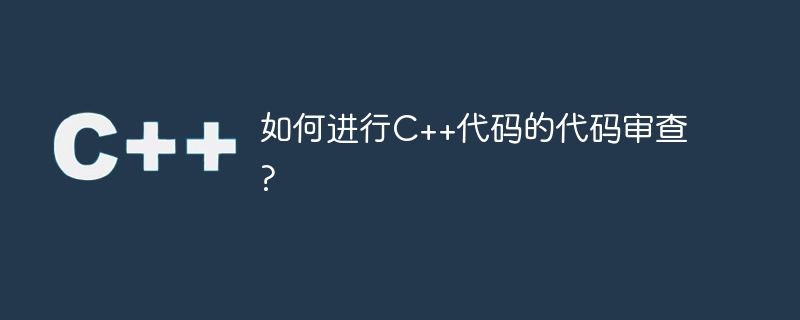
How to conduct code review of C code?
Code review is a very important part of the software development process. It can help the development team identify and correct potential errors, improve code quality, and reduce the workload of subsequent maintenance and debugging. For strongly typed static languages like C, code review is particularly important. Here are some key steps and considerations to help you conduct an effective C code review.
- Set code review standards: Before conducting a code review, the team should jointly develop a code review standard to agree on how various errors and violations will be handled, and how feedback will be provided. This standard can include recommendations on naming conventions, error handling, memory management, etc.
- Static code analysis tools: Using static code analysis tools can greatly improve the efficiency of code review. These tools can automatically detect common errors and potential problems, such as memory leaks, null pointer references, etc. In C, commonly used static code analysis tools include Cppcheck, Clang, etc. These tools can be integrated into your integrated development environment to automatically perform static analysis.
- Focus on memory management: In C, manual memory management is an important task, so special attention needs to be paid to memory-related issues during code review, such as memory leaks, null pointer references, out-of-bounds access, etc. Check each pairing of the new operator and delete operator to ensure that memory is released correctly.
- Review design and architecture: Code review is not just a check of syntax and functionality, but should also focus on the design and architecture of the code. Review code for scalability, maintainability, and reusability. Ensure that the code complies with object-oriented design principles and follows the single responsibility principle, the opening and closing principle, etc.
- Multiple person code review: Code review should involve multiple people, each participant bringing a different perspective and experience. Multi-person review identifies more issues and provides more comprehensive feedback. At the same time, multi-person review can also improve the technical level of team members to a consistent high level.
- Focus on code style: Unification of code style helps improve the readability and understandability of the code. In C, there are some common coding style conventions, such as naming conventions, indentation, use of parentheses, etc. When reviewing code, you need to check whether the code conforms to the style agreed by the team and contributes to the maintenance and readability of the code.
- Provide meaningful feedback: The purpose of code reviews is to improve the overall code quality of the team, not just to point out errors. When providing feedback, specific suggestions and explanations should be given to help developers better understand the problem and provide possible solutions.
Code review is an important part of ensuring code quality in the software development process. For strongly typed static languages like C, code review is particularly important. By setting code review standards, using static code analysis tools, focusing on memory management, reviewing design and architecture, involving multiple people, focusing on code style, and providing meaningful feedback, you can effectively conduct code reviews of C code and improve code quality. and development efficiency.
The above is the detailed content of How to conduct code review of C++ code?. For more information, please follow other related articles on the PHP Chinese website!


 What are the differences between c++ and c language
What are the differences between c++ and c language Recommended learning order for c++ and python
Recommended learning order for c++ and python Cost-effectiveness analysis of learning python and c++
Cost-effectiveness analysis of learning python and c++ Is c language the same as c++?
Is c language the same as c++? Which is better to learn first, c language or c++?
Which is better to learn first, c language or c++? The difference and connection between c language and c++
The difference and connection between c language and c++ C++ software Chinese change tutorial
C++ software Chinese change tutorial Cost-effectiveness analysis of learning python, java and c++
Cost-effectiveness analysis of learning python, java and c++



